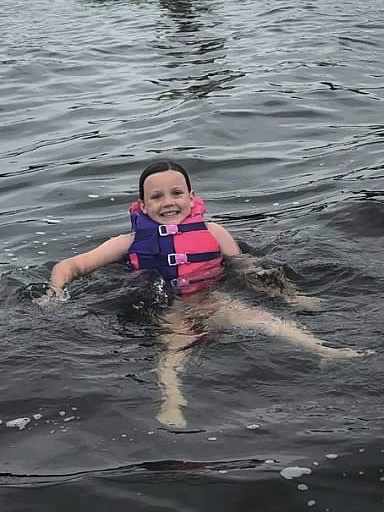 SPECIAL NOTE: Foss Swim School sponsored the 2020 Minnesota Walk to Cure Juvenile Arthritis on March 7, 2020. You can still donate; to learn more, please visit the Walk to Cure Juvenile Arthritis event page.
SPECIAL NOTE: Foss Swim School sponsored the 2020 Minnesota Walk to Cure Juvenile Arthritis on March 7, 2020. You can still donate; to learn more, please visit the Walk to Cure Juvenile Arthritis event page.
Swimming is great for all kids. It has additional benefits for kids like Kelsey, a 9-year old with Juvenile Idiopathic Arthritis. The disease, which causes pain in her joints, is well-managed with medication, but does mean she has to adapt how she gets physical activity. And that’s where swimming has been especially helpful.
“Swimming is great,” says Kelsey’s mother Anjanette, an employee of FOSS and a former self-described “FOSS mom” (both Kelsey and her older brother learned to swim at FOSS before Anjanette joined the company.) “It keeps her really active, and in the water she’s basically weightless,” relieving strain that might cause pain in her joints.
Biggest benefits: Strength, safety and social
But the biggest benefit in Kelsey’s case are those that every kid enjoys when they attend swim school: building strength in muscles, improved water safety and the social benefits of group learning.
“Her muscles stay strong and support her joints,” Anjanette points out. For kids with JIA, exercise can help make everyday activities easier, especially when they experience flares. But if their arthritis keeps them from exercising, a lack of strengthening can make future flares worse which could lead to a negative cycle of less exercise, lower strength and weaker joints.
In addition, swim school is a place where all kids develop social skills and learn about water safety. While neither of these benefits is unique to kids who may have joint or muscular issues, Anjanette notes that the social and group aspects of water activity are welcome for kids who might not be able to participate in other team sports.
“There’s peer to peer interaction with kids who all enjoy water,” Anjanette says. “There’s also adult interaction for the kids with teachers and coaches. Learning to race is something she can do.”
Similar benefits for a range of kids’ conditions
Kids with juvenile arthritis aren’t the only ones who can benefit from swim school. They might have limited opportunities to participate in many sports, but they can attend swim class without special adaptations.
The strengthening and social benefits of swim class may benefit kids with many conditions, including:
- Muscular dystrophy
- Mitochondrial or metabolic myopathies
- Bone disorders such as osteoperosis
- Juvenile dermatomyositis
- Juvenile ankylosing spondylitis
- Fibromyalgia
- Other forms of juvenile arthritis
Foss Swim School works with kids with many of these conditions, and in many cases where symptoms are not severe they participate in the same classes with other kids – the school just asks to be made aware of any special considerations if there are any limitations or signs to watch for when the class may be too much.
Private lessons are available for kids who need some modification to the classes. FOSS does not provide aquatic therapy that may be prescribed to kids with advanced disorders, but our curriculum and approach can help all kids learn to be safer around water and have fun.
Anjanette’s advice to parents of kids with conditions that limit physical activities is simple: “Staying active is super important. You’ve got to make sure there is an outlet for your child,” she says. “Don’t think you have to completely modify everything that they’re doing. You have to let them try, and they’ll tell you if they can’t do it.”